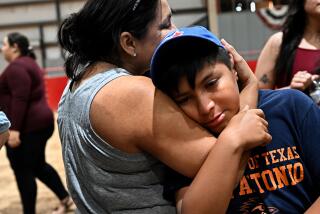Bush Cites Role of Family in Stemming Violence
- Share via
WASHINGTON — In his first reaction to the shootings at Santana High School, President Bush has offered a fleeting glimpse of one of his most deeply held beliefs: that private action is far more important than public policy in preventing such tragedies.
When asked what a president could do to stop such shootings, Bush talked neither about gun control, the most common response among liberals, nor violence in popular culture, the typical response of conservatives. Instead, he cited the relationship between children and their parents or other adults in their lives.
“All adults in society can teach children right from wrong,” he said.
By contrast, in the aftermath of the 1999 Columbine High School shootings, President Bill Clinton immediately offered a full menu of government initiatives--from new gun control measures to a White House summit aimed at reducing violence in movies, video games and music.
White House aides say that Bush will eventually offer more of a policy response to the shootings at Santana; during the presidential campaign, he proposed several measures to reduce school violence and endorsed some gun control proposals. But those close to him say that his initial instinct to look toward the kitchen table for solutions reflects his belief that such government actions ultimately have limited impact.
“When he talks about these deep, fundamental social problems, he often sees them in terms of parental responsibility,” said a senior White House advisor who spoke on condition of anonymity while discussing conversations with the president.
Bush’s remarks have drawn praise from some conservatives, who believe politicians create unrealistic hopes when they offer policy responses to events like Monday’s shooting. But on the left and right, other figures who are active in the debate over youth violence believe that Bush may be tilting too far toward the responsibilities of parents and focusing too little on those of public officials.
Parental responsibility “is just one piece of the puzzle that exists here,” said Sen. Dianne Feinstein (D-Calif.). “You can’t solve the problem without addressing . . . the peer culture and the culture of violence. And you have to also address the easy access to firearms.”
While endorsing Bush’s focus on parents, former Education Secretary William J. Bennett, a leading conservative social theorist, also said the president needs to provide a broader response.
“The task isn’t to make him a busybody or a liberal interventionist,” Bennett said. “But when these acts occur, they are dramas on the national stage and the president, in addition to teaching what the ultimate source of our strength is [in families], has to lead the conversation, not just in generalities but perhaps in particulars [of what government can do]. I don’t criticize what he’s said; I just say there is another dimension.”
Bush’s family-focused response to the Santana shooting is characteristic. In an interview with The Times days after the Columbine massacre, he responded almost exactly the same way.
“Of course there is going to be reactions--pass a law,” he said. “The big law is the universal law--how do mothers and dads do their jobs. The fundamental question is going to be: Can America rededicate itself to parenting as the No. 1 priority for all of us?”
David Horowitz, president of the conservative Center for the Study of Popular Culture in Los Angeles, praised Bush’s reticence in reacting to the Santana shooting. “I think it’s the only reasonable position,” he said. “You can’t make a law that prevents these tragedies.”
But Bennett, a former White House drug czar and longtime critic of violence in entertainment, said it would be appropriate for Bush to discuss issues such as access to guns or the role of violence in popular culture in the wake of such incidents.
Feinstein, like other Democrats, said legislators should reconsider the package of gun control measures that stalled in the last congressional session. Bush supports some gun control measures. During the 2000 campaign, he proposed mandatory trigger locks for new handgun purchases while endorsing a Clinton proposal to raise the age for legal handgun ownership to 21 from 18. Yet Bush chose to mention none of these in his first responses to the Santana shootings. Several White House advisors said that he would eventually highlight such provisions, but he was unlikely to do so while the shootings were still fresh in memory. “There is just something inside of him that is repulsed by doing something that looks like it is being driven by a desire to make political hay out of this,” said one official.
More to Read
Get the L.A. Times Politics newsletter
Deeply reported insights into legislation, politics and policy from Sacramento, Washington and beyond. In your inbox twice per week.
You may occasionally receive promotional content from the Los Angeles Times.










